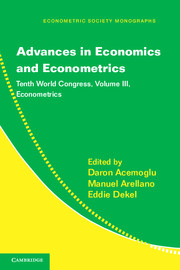Book contents
- Frontmatter
- Contents
- Contributors
- Preface
- I ECONOMETRICS OF INDUSTRIAL ORGANIZATION
- 1 Game Theory and Econometrics: A Survey of Some Recent Research
- 2 Recent Developments in Empirical IO: Dynamic Demand and Dynamic Games
- 3 Estimation of (Dynamic) Games: A Discussion
- II MACROECONOMETRICS
- III ECONOMETRIC THEORY
- IV EMPIRICAL MICROECONOMICS
- V TIME SERIES AND PANELS
- VI MIRRLEES REVIEW: RETHINKING THE TAX SYSTEM FOR THE TWENTY-FIRST CENTURY
- Name Index
- Miscellaneous Endmatter
3 - Estimation of (Dynamic) Games: A Discussion
Published online by Cambridge University Press: 05 May 2013
- Frontmatter
- Contents
- Contributors
- Preface
- I ECONOMETRICS OF INDUSTRIAL ORGANIZATION
- 1 Game Theory and Econometrics: A Survey of Some Recent Research
- 2 Recent Developments in Empirical IO: Dynamic Demand and Dynamic Games
- 3 Estimation of (Dynamic) Games: A Discussion
- II MACROECONOMETRICS
- III ECONOMETRIC THEORY
- IV EMPIRICAL MICROECONOMICS
- V TIME SERIES AND PANELS
- VI MIRRLEES REVIEW: RETHINKING THE TAX SYSTEM FOR THE TWENTY-FIRST CENTURY
- Name Index
- Miscellaneous Endmatter
Summary
Introduction
The last 10 years witnessed a number of advances in empirical industrial organization (IO). Exciting new methods for estimating dynamic models and especially dynamic games were developed. These new methods enable researchers to use a wider set of empirical tools. The new methods had positive effects on the well-received literature on estimating static games. At the same time, there have been improvements in single-agent dynamic-model estimation.
The two papers provide excellent surveys covering selected setups in detail. The setups include models with strategic interaction in static and dynamic settings and dynamic single-agent models with a focus on storable-and durable-goods demand models. The single-agent and multi-agent dynamic frameworks enable researchers to explicitly model dynamic linkages in state variables or in payoffs. The setups also nest the static games (or single-agent) setting that arises as a special case when agents are myopic and assign no value to the future.
Three types of dynamic linkages can be distinguished: (1) a strategic linkage arises when a firm's (or consumer's) strategy is allowed to depend on past choices of (all) firms (or consumers); (2) an informational linkage arises when informational uncertainty is resolved gradually over time; and (3) a third type of linkage arises when the current payoff depends on state variables influenced by prior actions. The surveyed literature studies the third type of linkage.
- Type
- Chapter
- Information
- Advances in Economics and EconometricsTenth World Congress, pp. 123 - 134Publisher: Cambridge University PressPrint publication year: 2013
- 1
- Cited by



